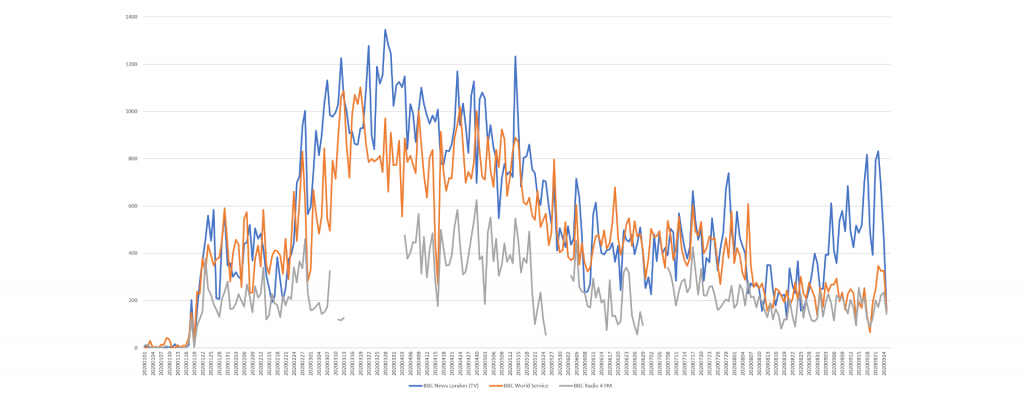How closely synchronized has television and radio news attention been towards COVID-19? Have they largely followed the same coverage contours or did one medium pick up on the outbreak sooner than the other? Using data from the Internet Archive's Television News and Radio News Archives, we can use the Television News 2.0 Ngrams and brand new Radio News Ngrams to explore this question using BBC's coverage of the pandemic.
The timeline below tracks the number of times the words "coronavirus" or "covid" or "virus" or "corona" (a common ASR error is splitting "coronavirus" into two words "corona virus") were mentioned each day since the start of this year across the television station BBC News London and the radio stations BBC World Service (focused on the international market) and BBC Radio 4 FM (focused on the domestic market).
All three channels broadcast around an average of 215,000 words per day, meaning they are directly comparable.
Immediately clear is that all three picked up on the virus at the same time on January 17, peaked in mid-March, declined through mid-June and have remained stable since. BBC News London and BBC World Service have been largely synced over the course of the pandemic, with the domestically-focused BBC Radio 4 FM devoting around half as much coverage.
One major deviation is that BBC's television news coverage has substantially ramped back up its COVID-19 coverage since the end of August, while its radio coverage has remained relatively flat.
The timeline below shows the total number of spoken words on each of the stations over this year, showing there was a decrease in the spoken word count on BBC starting in June, though its unclear whether this is a technical issue or a genuine shift towards less spoken words. Excluding the radio dropouts (days where there was reduced radio monitoring or ASR speech recognition) and excluding the period of reduced television spoken word count, all three stations have an extremely similar daily spoken word count.
Since these dropouts could affect the earlier results, the timeline below shows the same results as the first graph, but instead of raw word count, it plots the percentage of spoken words on each station each day that were COVID-19-related. The results are identical, confirming that even with normalization the findings stand.
TECHNICAL DETAILS
Constructing this graph took just a single SQL query, seen below. The query actually combines 6 separate queries into a single SQL query, lining up all of the results into a single spreadsheet.
SELECT DATE, SUM(TVCOVID) TVCOVID, SUM(TVALL) TVALL, SUM(RADIOWORLDCOVID) RADIOWORLDCOVID, SUM(RADIOWORLDALL) RADIOWORLDALL, SUM(RADIOFMCOVID) RADIOFMCOVID, SUM(RADIOFMALL) RADIOFMALL from ( (SELECT DATE, SUM(COUNT) TVCOVID, 0 TVALL, 0 RADIOWORLDCOVID, 0 RADIOWORLDALL, 0 RADIOFMCOVID, 0 RADIOFMALL FROM `gdelt-bq.gdeltv2.iatv_1gramsv2` WHERE DATE(TIMESTAMP) >= "2020-01-01" AND (NGRAM='coronavirus' OR NGRAM='covid' OR NGRAM='virus' OR NGRAM='corona') AND STATION = 'BBCNEWS' group by DATE order by DATE) UNION ALL (SELECT DATE, 0 TVCOVID, SUM(COUNT) TVALL, 0 RADIOWORLDCOVID, 0 RADIOWORLDALL, 0 RADIOFMCOVID, 0 RADIOFMALL FROM `gdelt-bq.gdeltv2.iatv_1gramsv2` WHERE DATE(TIMESTAMP) >= "2020-01-01" AND STATION = 'BBCNEWS' group by DATE order by DATE) UNION ALL (SELECT DATE, 0 TVCOVID, 0 TVALL, SUM(COUNT) RADIOWORLDCOVID, 0 RADIOWORLDALL, 0 RADIOFMCOVID, 0 RADIOFMALL FROM `gdelt-bq.gdeltv2.iaradio_1grams` WHERE DATE(TIMESTAMP) >= "2020-01-01" AND (NGRAM='coronavirus' OR NGRAM='covid' OR NGRAM='virus' OR NGRAM='corona') AND STATION = 'BBC World Service' group by DATE order by DATE) UNION ALL (SELECT DATE, 0 TVCOVID, 0 TVALL, 0 RADIOWORLDCOVID, SUM(COUNT) RADIOWORLDALL, 0 RADIOFMCOVID, 0 RADIOFMALL FROM `gdelt-bq.gdeltv2.iaradio_1grams` WHERE DATE(TIMESTAMP) >= "2020-01-01" AND STATION = 'BBC World Service' group by DATE order by DATE) UNION ALL (SELECT DATE, 0 TVCOVID, 0 TVALL, 0 RADIOWORLDCOVID, 0 RADIOWORLDALL, SUM(COUNT) RADIOFMCOVID, 0 RADIOFMALL FROM `gdelt-bq.gdeltv2.iaradio_1grams` WHERE DATE(TIMESTAMP) >= "2020-01-01" AND (NGRAM='coronavirus' OR NGRAM='covid' OR NGRAM='virus' OR NGRAM='corona') AND STATION = 'BBC Radio 4 FM' group by DATE order by DATE) UNION ALL (SELECT DATE, 0 TVCOVID, 0 TVALL, 0 RADIOWORLDCOVID, 0 RADIOWORLDALL, 0 RADIOFMCOVID, SUM(COUNT) RADIOFMALL FROM `gdelt-bq.gdeltv2.iaradio_1grams` WHERE DATE(TIMESTAMP) >= "2020-01-01" AND STATION = 'BBC Radio 4 FM' group by DATE order by DATE) ) GROUP BY DATE order by DATE asc
We're excited for how you're able to use this incredibly powerful new Radio News Ngrams dataset to explore the landscape of spoken word journalism!
